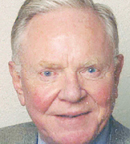
Haakon Ragde, MD
The American Society for Radiation Oncology (ASTRO) has selected Haakon Ragde, MD, as its 2016 Honorary Member, the highest honor ASTRO confers on distinguished cancer researchers, scientists, and leaders in disciplines other than radiation oncology, radiobiology, or radiation physics. Dr. Ragde will be inducted as the 2016 ASTRO Honorary Member during an awards ceremony at ASTRO’s 58th Annual Meeting, September 25–28, 2016, in Boston.
“Dr. Ragde is a luminary in the field of medicine,” said ASTRO Chair Bruce D. Minsky, MD, FASTRO. “His work has become the standard of care in a number of areas. As a board-certified urologist, he has an impressive array of achievements, including introducing seed implantation for prostate cancer into the United States, introducing transrectal ultrasonography, and introducing the transrectal ultrasound-guided prostate biopsy method now used. He also took part in bone marrow transplant research that earned researcher E. Donnall Thomas, MD, the Nobel Peace Prize for Physiology or Medicine in 1990.”
Strong Record of Accomplishment
Dr. Ragde holds a Professorship in Urology at the University of Virginia, where he received his medical degree.
After his postgraduate training, he accepted a staff position in general surgery and urology at the University of Washington. There, Dr. Ragde and a colleague performed the first successful kidney transplants in the state of Washington. When Dr. Thomas, the hematology professor who would ultimately win the Nobel Prize, approached Dr. Ragde with an offer to join his bone marrow transplantation research team, Dr. Ragde agreed.
The team—Drs. Thomas and Ragde and two internists, Ranier Storb, MD, and Robert Epstein, MD—studied how bone marrow transplantation might cure leukemia and other cancers of the blood by replacing the diseased marrow with healthy marrow.
According to Dr. Ragde, his greatest career accomplishment was template-directed brachytherapy for prostate cancer. He opened a private practice in urology in Seattle following his work with Dr. Thomas and became an expert in transrectal ultrasonography of the prostate.
Dr. Ragde also established the Pacific Northwest Cancer Foundation and the Haakon Ragde Foundation for Advanced Cancer Studies. He retired from active practice in 2003 and now researches immunotherapy. ■

